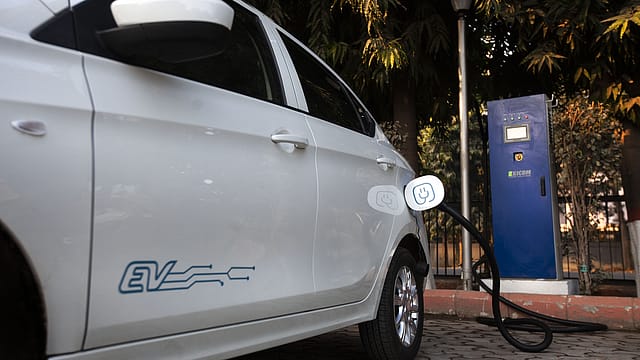Govt incentives to increase EV penetration in India: Moody's
ADVERTISEMENT

Moody's Investors Service expects various incentives announced by the Indian government to drive an increase in EV penetration.
India has the fourth-largest car market globally, but EV penetration is currently only around 1%, the credit ratings agency says.
"We expect various government incentives will drive an increase in EV penetration. These include consumer incentives, production-linked incentives for advanced battery storage to drive local cell manufacturing, goods and services tax (GST) rate cuts, and other state level subsidies," says Moody's.
The pace of increase in EV sales and increase toward the government's target of 30% by 2030, will also depend on the country's charging infrastructure, and consumers' readiness to switch to EVs from traditional ICE vehicles, it adds.
According to Moody's, Tata Motors retains an early mover advantage in the battery electric vehicles (BEV) market in India, with an 85% share for the period April through December 2022.
Presence through 250 dealers across 165 cities, and with close to 4,300 charging points, has already allowed the company to sell some 50,000 EVs, it says.
Tata plans to increase its EV line up from four models to 10, by March 2026. The carmaker's EV business already raised $1 billion from private equity investor TPG.
The rapid growth of Battery Electric Vehicles will translate to about one-third of global light vehicle sales by 2030 and nearly half by 2035, according to Moody's analysis. This is a faster uptake than we previously forecast (25% by 2030), resulting from tighter environmental regulations and more aggressive electrification targets from automakers.
Moody's also reduced its expectations for Plug-in Hybrid Electric Vehicles (PHEVs) sales to just around 7%, from a previous 9% for 2030, because of high costs for producing redundant propulsion systems along with falling government subsidies.
Internal combustion engine vehicles will still be needed for many years, especially in emerging markets with limited charging infrastructure and less governmental support of BEVs, says Moody's.
Global battery electric vehicle sales were around 8 million, with 65% of these in China, according to Moody's. Europe represented nearly 20%.
"By 2035, we expect global BEV market share to be much more balanced, but with large regional variations. China's share of the global BEV market will come down to around a third, given our assumed BEV penetration of slightly more than 50%. Europe's share will increase to nearly 30%, as regulations will require all new vehicles to be zero emission by 2035. In the US, BEV penetration will climb toward 60%, raising the country's global BEV market share to around 25%. Emerging markets will remain underrepresented, but the transition could be accelerated by stricter regulation," the ratings agency says.